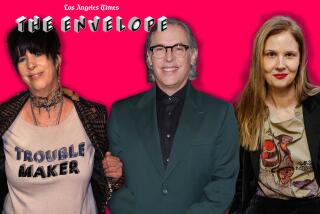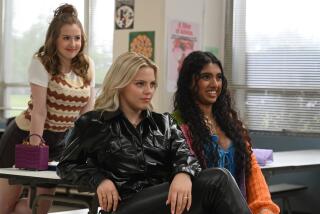Some real grace notes
- Share via
Hard to believe, but Megan Mullally -- the pampered, helium-voiced Park Avenue socialite-cum-office assistant Karen Walker on “Will & Grace” -- can sing. Among her credits: recording jingles and performing in a rock band, a jazz trio and a four-part harmony group.
After landing in the Broadway revivals of “Grease” and “How to Succeed in Business Without Really Trying,” the Oklahoma City native appeared in “Sweetheart,” a 1999 one-woman show at West Hollywood’s Coast Playhouse.
Recently, she released her second album, “Big as a Berry” -- an eclectic mix of standards, rock, country and blues that she and her band, the Supreme Music Program, recorded in 2 1/2 days.
Some critics speculated that this album was a way of differentiating yourself from your TV character -- playing different notes, literally and figuratively.
I actually formed my band five years ago, before “Will & Grace.” Singing isn’t an attempt to branch out, but who I really am. I like less commercial and conventional material than the acting jobs I get. Those roles are flights of fancy. Though I collaborate with my band, it’s my music, my vision. I pick the songs. I’m a control freak, very hands-on.
Some songwriters -- Bertolt Brecht & Kurt Weill, Randy Newman, Tom Waits -- surfaced in both of your albums. Why are you drawn to them?
Singing, to me, is acting on pitch. I decided not to go for sound, vocal gymnastics, but for songs that tell a story. Each of them is written in the voice of a character who drops you off in a little world. Newman’s “Real Emotional Girl” and Bobbie Gentry’s “Fancy” could probably be done as monologues. I try to avoid generic “June, moon, spoon” pieces ... ear candy without content. What matters is creating something people can connect with. And my approach: very lo-fi. Albums can be flat-lined when you overproduce them, spending six months in the studio. “Big as a Berry,” by the way, is selling great ... without a single, a video or radio play.
Critics panned “Sweetheart,” your one-woman show. Was that a setback?
“Sweetheart” was an assault, a dark piece of performance art that didn’t pander to expectations. Audiences loved it, but critics didn’t want to play along. In the wake of “Will & Grace,” someone said, they expected me to adopt a Park Avenue persona, singing Judy Garland songs on a little pink poof. People get stuck because they’re afraid to fail.
Doesn’t the role of Karen strain your vocal cords?
Nah.... It involves my tongue more than my voice. It’s nasal, in fact. And a lot of that stuff is psychological. Some singers wear a wool scarf in the summer but, during “How to Succeed,” I didn’t even warm up sometimes. And I never took singing lessons because I’m intuitive rather than analytical. When I was 4, I began singing songs from the radio and my parents’ albums. As an only child, I had a desperate need for self-expression.
Unlike a lot of singers, you don’t change the lyrics of songs written in the male voice.
I sing a song the way the writer wrote it. I want to be respectful. And why can’t a woman sing love songs like “Ruby’s Arms” or “Marie” without changing it to “Rudy’s Arms” or “Murray”? People want to prescribe rules but I don’t want to be limited. Everyone is innately bisexual. Some people just realize it to a greater degree than others.
-- Elaine Dutka
More to Read
The biggest entertainment stories
Get our big stories about Hollywood, film, television, music, arts, culture and more right in your inbox as soon as they publish.
You may occasionally receive promotional content from the Los Angeles Times.










